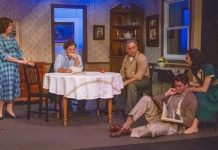I recently had the occasion to attend “The Ghost Sonata” at The Actors’ Gang. However, as this is a workshop production and therefore not open to review, I took the opportunity to chat with director Brian T. Finney about his process and thoughts on this enigmatic play by August Strindberg.
Kat: What about this play interested you? Why did you want to direct this one?
Brian: I saw the play around 30 years ago and there was something hypnotic about the silence. I wanted to expound and expand the silence. I find the directness of Strindberg’s depression to be somewhat refreshing. He embraces it and expresses his feelings about life so eloquently and exactly. I admire that.
Kat: What has your rehearsal process been like? The production has a very stylized feel. Was that completely from you, or has it been an organic, collaborative process with the cast?
Brian: We had two weeks for rehearsal. A very short process. Luckily I am working with The Actors’ Gang, a theater I have been involved in for twenty years. We have a common language that we all speak and share and practice. As a company, we work every Sunday night in the styles of theater we have adopted, Commedia being the most prominent among them. So the things you saw were the product of many years of collaborative work among us as well as the very diligent work of Cynthia Ettinger, who, as lead teacher of our classes and Sunday night workshops has really coalesced our physical and verbal vocabulary.
Since my rehearsal process was so truncated, I took advantage of our vocabulary and gave the group a lot of reign within that construct. Mainly in the big group work. I would say that I can’t work with you all one on one, so you have to find a repetitive task that is short and distinct and something you can do for two hours, and it has to be simple and in that simplicity, interesting.
I truly believe that if someone is fully involved with their task, (we call it being “stated”), they are eternally watch-able. An actor moving a stool from one side of the stage to the other and back again and again is for me, hypnotic. The mind starts telling the story of the stool carrier. Asking why does he keep doing that, why doesn’t he stop? Why is it so important to him? Then the mind fills in with its own answers which are much more interesting than if I told you why he is doing this action.
Kat: Why do a workshop production, instead of just producing the piece?
Brian: We did this as a Workshop, mainly because of the extremely short rehearsal process. We also look at our productions with the long view in mind. Many of our shows are designed for touring and we have that in mind for every production, if we tour them or not. We first did 1984 almost ten years ago and we still have requests from around the world for it to be performed. So, we like to mold and hone the productions. A marathon approach as opposed to a sprint. We think and believe that there is longevity for our productions and having the freedom to have several weeks of performance and audience feedback without the pressure of having it “ready” for reviewers gives the players and production breathing room to work ideas out to their full incarnation.
Kat: Is there anything that you’ve learned that has surprised you from the audiences?
Brian: What I love about the responses after the show are how diverse they are and how an audience member will come to me and say something to the effect of, “Oh, I see why you did this.” Or, “I understand your choice for that.” It is very satisfying, because what is happening is the human mind’s incredible need to understand and find meaning.
Early in the run a gentleman approached me after the show and introduced himself. He is a director and actor at the Stockholm Theater in Stockholm and the home of Strindberg. He was also Ingmar Bergman’s protégé and worked under him while Bergman directed two productions of The Ghost Sonata. I almost cried when he loudly exclaimed, “This is exactly what Bergman wanted to do with this production! He wanted to strip it down! And you did in so many ways!” It was a thrill and filled the cast with a great deal of pride.
There are a lot of things I chose to include in the show that has no necessary meaning at all, sometimes it is just aesthetically pleasing or provocative or fascinating. It is like a dream. A surreal dream. The script itself is over written in many places and underwritten in others which is why I chose to have so many visual things happening on the stage. It is also what Strindberg wanted. He wanted to have all the actors to never leave the stage and I wanted to honor that.
Kat: Is there a full production planned in the future?
Brian: Depending on our post mortem of the production and company interest and scheduling; yes. I am hoping it will be available to do in October to coincide with Halloween.
Kat: What do you hope people get out of this production?
Brian: I hope that audiences walk away with a feeling of wonderment. I wanted to gear this show in the direction of a Cirque Du Soleil production. Something that will visually imprint itself on our subconscious while the words of Strindberg’s emotionally dark, yet humorous text rattles away in our mind.
“The Ghost Sonata”
The Actors’ Gang
Through April 26
Tickets: www.theactorsgang.com or 310.838.4264
Kat Michels is a writer, two-time Telly and Regional Emmy award-winning documentarian, poet, Los Angeles theater critic and above all else storyteller. Her children’s book Children Have Got to Be Carefully Taught was released in January of 2014 and is now available on Amazon. www.katmichels.com.













